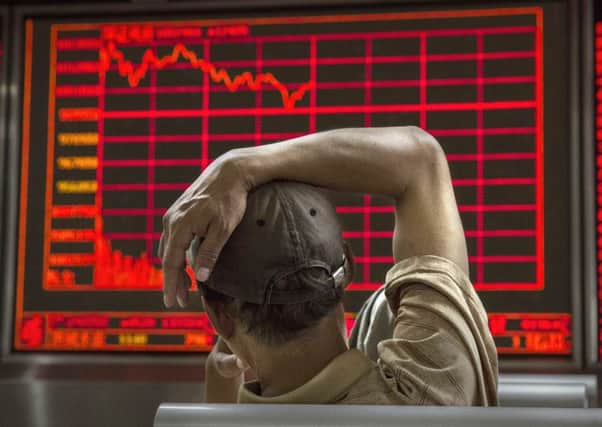Jeff Salway: China market slump mirrors greater woes


Investors around the world are playing a wait-and-see game this weekend amid uncertainty over the extent to which financial turmoil in China will ripple through the global economy.
While some experts believe world markets stand on the precipice of a full-blown crisis, others insist that the fallout from events in China will remain contained.
Advertisement
Hide AdAdvertisement
Hide AdThe latest volatility in China, which last week suffered huge stock market losses that triggered a brief but sharp global equity sell-off, has left ordinary investors and pension savers anxious over the implications of any further turbulence.
The Shanghai Composite Index, China’s main stock market doubled in value in the year to early June, but almost half of that growth has now been wiped off.
The volatility has spread to other markets across the globe over the past two weeks.
The UK’s FTSE has experienced the most sustained falls since 2003, recently losing 10 per cent of its value in just ten trading days, while there were similar losses in the US, Asia and Europe.
Markets have bounced back over the past three days to recover some of the losses incurred on “black Monday”, but there are suggestions that the post-financial crisis bull market may finally be over.
Simon Lloyd, chief investment officer at Murray Asset Management, said: “The sharp moves in equity markets have certainly put a stop to upward momentum for the time being and the severity of the move will have dented sentiment leading to a more cautious approach from investors.
“It is likely that we will see a period of consolidation at these levels and it is not yet confirmed that we have seen the lows.”
There is a danger of investors reading too much into stock market moves in China, according to Richard Wadsworth, chartered Financial Planner at Carbon Financial Partners. He pointed out that the correlation between the Chinese economy and the stock market remains weak.
Advertisement
Hide AdAdvertisement
Hide Ad“The Chinese stock market is tiny compared to the Chinese economy, and it is an immature market which has and continues to be subject to government intervention as it experiences growing pains, so perhaps we shouldn’t read too much into its movements,” he said.
The greatest concern is over the slowdown in the Chinese economy. The extent to which it will be affected by the events of recent weeks, not least the government’s interventions and how that will impact on economies elsewhere remains to be seen.
“While the Chinese economy is slowing, forecasts for growth remain far in excess of those for developed markets, so perhaps, as ever, global stock markets have simply got ahead of themselves in terms of growth expectations for China and are now readjusting,” said Wadsworth.
With China now the world’s second biggest economy and forecast by the IMF to be the biggest single contributor to global growth over the next five years, even a modest slowdown can have a significant knock-on effect.
Millions of ordinary UK investors and pension savers have some exposure to China through collective funds that invest in the country, directly or indirectly. But while it’s a good time to review those portfolios, said Wadsworth, the last thing to do is panic.
“The biggest risk from our perspective is panicking and selling. Markets fall, we know that, we’ve been here before and we’ll be here again,” he said.
“But while it may be very uncomfortable, we need to remain calm and not sell. Selling simply crystallises a paper loss when, in most cases, there is no need to crystallise it.”
A quick review of portfolio holdings is always worthwhile, however.
Advertisement
Hide AdAdvertisement
Hide Ad“The downturn may have revealed to some that they are not as comfortable with risk as they thought or they perhaps don’t have as much in the way of ‘safe’ investments to fall back on when markets have fallen,” said Wadsworth.
“If this is the case, then, once markets recover, they should perhaps review the overall split of their investments and cash, and adopt a more cautious approach. In the meantime, sit tight and stick with the plan.”
There may even be new opportunities to look at in the wake of the volatility, according to Lloyd, who pointed out that there will likely be a further delay in interest rate rises in the UK and US.
“Opportunities for investors are being revealed, particularly in the FTSE 100 which has performed worse than the FTSE250, but we don’t expect the companies with exposure to the emerging markets will be chased higher until the effects of the commodity collapse, strong US Dollar and slowing Chinese economy are fully priced in,” he said.